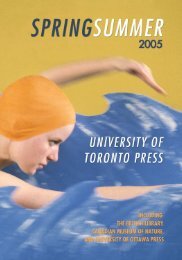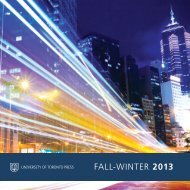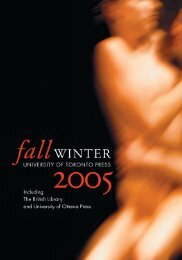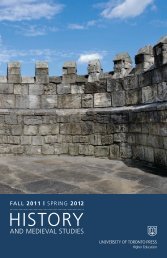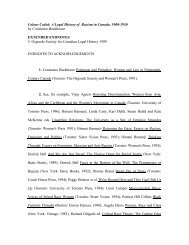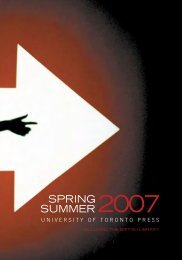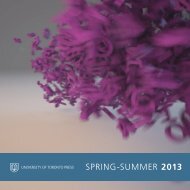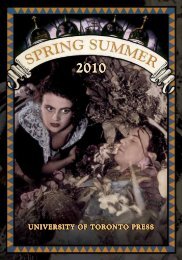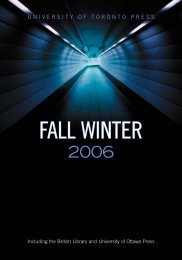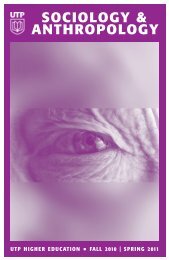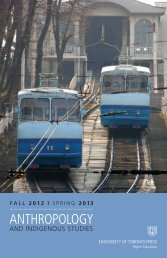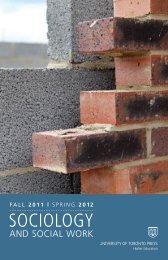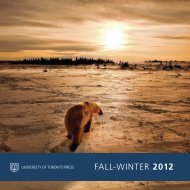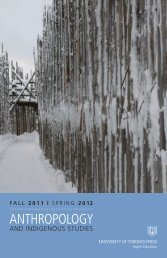Classics, Medieval & Renaissance 2012 - University of Toronto ...
Classics, Medieval & Renaissance 2012 - University of Toronto ...
Classics, Medieval & Renaissance 2012 - University of Toronto ...
Create successful ePaper yourself
Turn your PDF publications into a flip-book with our unique Google optimized e-Paper software.
LITERATURE<br />
Reading, Desire, and the Eucharist<br />
in Early Modern Religious Poetry<br />
NEW<br />
Ryan Netzley<br />
The courtly love tradition had a great influence on<br />
the themes <strong>of</strong> religious poetry: just as an absent<br />
beloved could be longed for passionately, so too<br />
could a distant God be the subject <strong>of</strong> desire. But<br />
when authors began to perceive God as immanently<br />
available, did the nature and interpretation <strong>of</strong><br />
devotional verse change Ryan Netzley argues that<br />
early modern religious lyrics presented both desire<br />
and reading as free, loving activities, rather than as<br />
endless struggles or dramatic quests.<br />
Challenging fundamental assumptions <strong>of</strong> literary<br />
criticism, Reading, Desire, and the Eucharist shows<br />
how poetry can encourage love for its own sake,<br />
rather than in the hopes <strong>of</strong> salvation.<br />
Ryan Netzley is an assistant pr<strong>of</strong>essor in the Department<br />
<strong>of</strong> English at Southern Illinois <strong>University</strong>,<br />
Carbondale.<br />
‘Speaking to central questions about sacramental<br />
and Eucharistic poetry in the Early Modern period,<br />
this high-quality study advances a fresh theoretical<br />
understanding <strong>of</strong> how reading and desire work.’<br />
David Ainsworth, <strong>University</strong> <strong>of</strong> Alabama<br />
304 pp / 6 x 9 / 2011<br />
Cloth 978-1-4426-4281-2 $70.00 (£48.99)<br />
Strangers in Blood<br />
Relocating Race in the <strong>Renaissance</strong><br />
Jean E. Feerick<br />
Strangers in Blood explores, in a range <strong>of</strong> early<br />
modern literature, the association between migration<br />
to foreign lands and the moral and physical degeneration<br />
<strong>of</strong> individuals. Arguing that in early modern<br />
discourse the concept <strong>of</strong> race was primarily linked<br />
with notions <strong>of</strong> bloodline, lineage, and genealogy<br />
rather than with skin colour and ethnicity, Jean E.<br />
Feerick establishes that the characterization <strong>of</strong> settler<br />
communities as subject to degenerative decline<br />
constituted a massive challenge to the fixed system<br />
<strong>of</strong> blood that had hitherto underpinned the English<br />
social hierarchy. In emphasizing the decline <strong>of</strong> blood<br />
as found at the centre <strong>of</strong> colonial narratives, Feerick<br />
illustrates the unwitting disassembling <strong>of</strong> one racial<br />
system and the creation <strong>of</strong> another.<br />
Jean E. Feerick is an assistant pr<strong>of</strong>essor in the Department<br />
<strong>of</strong> English at Brown <strong>University</strong>.<br />
‘Rich in its attention to language, and to a wellchosen<br />
range <strong>of</strong> historical and literary representations,<br />
Feerick’s remarkably well-written, persuasive, and<br />
original book emphasizes the perceived instability<br />
<strong>of</strong> early modern racial identities, their vulnerability<br />
especially to the conditions <strong>of</strong> transplantation, culture,<br />
time, and space.’<br />
Emily C. Bartels, Rutgers <strong>University</strong><br />
264 pp / 6 x 9 / 2010<br />
Cloth 978-1-4426-4140-2 $60.00 (£41.99)<br />
Northrop Frye’s Writings on Shakespeare<br />
and the <strong>Renaissance</strong><br />
Edited by Troni Y. Grande and Garry Sherbert<br />
This collection <strong>of</strong> writings brings together Northrop<br />
Frye’s large body <strong>of</strong> work on Shakespeare and other<br />
<strong>Renaissance</strong> writers (with the exception <strong>of</strong> Milton,<br />
who is featured in other volumes), and includes major<br />
articles, introductions, public lectures, and four<br />
previously published books. Spanning forty years <strong>of</strong><br />
Frye’s career as a university pr<strong>of</strong>essor and literary<br />
critic, these insightful analyses not only reveal the<br />
author’s formidable intellect but also <strong>of</strong>fer the reader<br />
a transformative experience <strong>of</strong> creative imagination.<br />
With extensive annotation and an in-depth critical<br />
introduction, the volume demonstrates Frye’s<br />
wide-ranging knowledge <strong>of</strong> <strong>Renaissance</strong> culture<br />
and its pivotal significance in his work, his impact<br />
on <strong>Renaissance</strong> criticism and the Stratford Shakespeare<br />
Festival, and his continuing importance as a<br />
literary theorist.<br />
Troni Y. Grande is an associate pr<strong>of</strong>essor in the<br />
Department <strong>of</strong> English at the <strong>University</strong> <strong>of</strong> Regina.<br />
Garry Sherbert is an associate pr<strong>of</strong>essor in the Department<br />
<strong>of</strong> English at the <strong>University</strong> <strong>of</strong> Regina.<br />
(Collected Works <strong>of</strong> Northrop Frye 28)<br />
968 pp / 6 x 9 / 2010<br />
Cloth 978-1-4426-4168-6 $195.00 (£136.99)<br />
utppublishing.com 27



